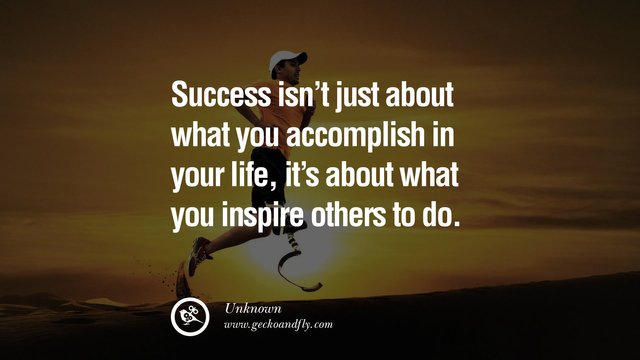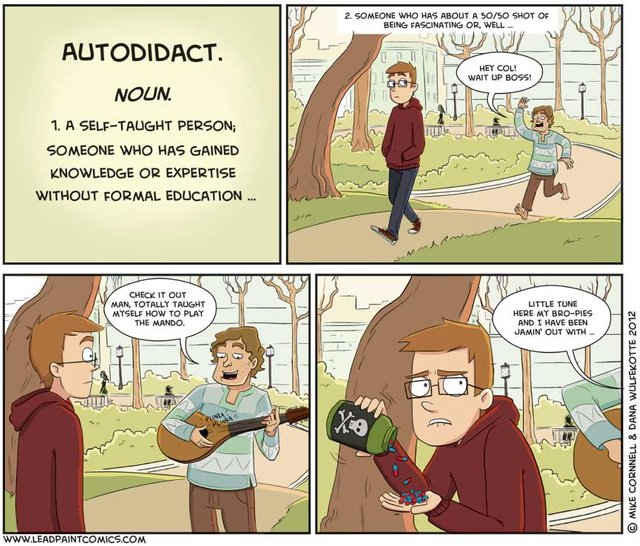Teaching what you know, while not being an expert - one autodidact’s strategy to mastery
As Albert Einstein once said about formal education still rings true today in that “one had to cram all this stuff into one’s mind, whether one liked it or not. This coercion had such a deterring effect that, after I had passed the final examination, I found the consideration of any scientific problem distasteful for an entire year”. It took me a good 6 months after graduating college to pick up a book to learn something new, just because, and I’m still working to undo the effects of imposter syndrome brought on by said system.
But after a few different jobs after college not in my field of study, taking a couple of community college classes in programming just for fun, and studying quite a few web development and now iOS books on my own to now working in IT and discovering what I was truly interested in – software development. Not that I'm saying that there isn't some truth in the cartoon below...
But in some fields, it's actually a plus to have the ability to learn something new and to be self-directed - to do it without a formal education or guidance.
Relearning to seek and share knowledge
I really believe if we all shared what we knew, we all would be smarter. But I feel that the culture that has been ingrained in everyone to hoard knowledge so as to prevent others from succeeding. It seems that everyone tries to one-up each other - to be first, to be famous, to be the most wealthy. It's almost like a disease really, as those that do share their knowledge are like black sheep, they stick out like a sore-thumb. I say, let’s end the spread of this attitude and culture by taking control of how we learn and sharing what we know with others!
By sharing what you know or have learned has two positives:
- You reinforce your knowledge, making you more of an expert with each passing day
- You can help others reach their goals and increase their knowledge
You can become an autodidact by deciding to take control of your own learning process and not leaving it up to others as to what you should learn or when you’ve reached a superficial level of mastery. An autodidact purposely seeks out opportunities to learn.
Becoming an autodidact requires two important factors - intention and intensity.
First, you need to define your goals and objectives. Without a goal or intention, you have no direction. A mindset of motivation requires an end result. Without the underlying driving force to learn something and to be better, there isn’t going to be any improvement and no desire to press on through difficult topics. Why do you want to learn what you are learning? Do you have passion for what you are about to undertake?
Intensity – Real learning takes time and focused effort
An autodidact does not just learn, he or she learns well. Autodidacts realize that not all methods of study bring the same results. Autodidacts focus on study methods that bring the most intense results, and are always doing checks and balances on what is working and what isn’t. You have to troubleshoot your process, constantly assessing whether the methods you are using actually work.
I realized the methods I was using to learning app development wasn’t working for me when I would just do gamified tutorials blindly, just to get a badge. This didn’t work for me, as when I would try to create something on my own, I couldn’t get it to work. So I had to reevaluate my strategy, so now I make videos sharing the topics I am learning. And by knowing I will have to share what I’m learning, makes me more accountable to myself and confirm what I really know, because once I start trying to explain an idea, topic or process in a video - I get immediate feedback on what I know and what I need to work on - on a personal level.
It also helps me narrow down what topics I need to add to my study plan or what I need to learn immediately to get over some bug or issue.
The amount of work that goes into creating a video about development is very beneficial, as I read what I want to learn about, reread to pull that 20% out for my notes then code from my notes. If I can’t get the code to work from my notes, I get immediate feedback that I’m missing something.
I then type out my notes for the "script" of the video and corresponding blog post. Repeating the code work again, to record the video. My videos are an extension of my notes, it’s one way to use the knowledge and place to play around with the concepts and code. I almost always discover something new.
All of this might be busy work to some, but touching the content repeatedly, helps me internalize it - cementing that knowledge while hopefully creating value to those who happen to view my videos. It is all about maximizing outputs and minimizing inputs. I do not learn for the sake of learning – I learn to gain real, tangible benefits for my life.
So you are probably wondering how to become a self-directed learner, well here’s a quick and dirty guide.
How to Be An Autodidact? It’s a lifestyle.
Consume Information – You cannot get smarter without access to new information. So the first lifestyle change you need to make is to get face-to-face with information as much as possible. You need to seek it out intentionally and constantly. How? There are many ways, but three of the best are books, internet and people. The internet alone contains more free information than you can consume in a lifetime. The autodidact knows this and is, therefore, aware of learning opportunities and potential resources that most other people miss.
Read as much as you can. Knowing that about 80% of any important knowledge or topic of a reading text is contained in only 20% of that text, flesh out that 20% and put it in your notebook! You have a notebook, right? If not, get one now!
Find people how know more than you do about the topic you want to learn, pick their brain.
The dumbest question is the one you don’t ask!
Be that person who is always asking questions and you will be well on your way to becoming an autodidact. Ask questions of the text you are studying or the person you are learning from. Find answers to those questions.
Use Information – After you begin reading things of value and asking lots of questions, you will rapidly become more intelligent. But if you stop at simply consuming information, you have not seized on the true purpose of being an autodidact.
Consumption is the first step; the next step is production.
We do not learn simply to hold information in our brains. Contrary to what the educational system spews out and practices.
So as you learn, you should have a clear image in your mind of how you will use that learning.
Whatever you study, find a way to use it immediately. Using the things you learn will make the experience more exciting, improve your memory, and keep you motivated and will build your confidence when you face challenging topics or concepts in the future.
Connect Information - You are consuming high-quality information. You are putting it to use in your life. The final step in the process of becoming an autodidact is to begin to connect information from unrelated sources and fields. Once you do this, you will achieve the ultimate goal of autodidactism = true intelligence.
A test of grit
Learning is a choice and it requires that you expose yourself to some risk. The possibility of others seeing your mistakes and that you are giving them the opportunity to expose them and make them glaring obvious is a given.
If you want to succeed, you have to put yourself out there. In spite of the critics, haters or that one dickhead who thumbs-down your video or your blog post. Change your perspective and leave your ego at the door - You are doing what they aren’t doing. Stay humble, learn from those mistakes and put everything into perspective – keeping that goal you have in mind.
If development and programming were easy or whatever you are undertaking was easy, everyone would do it. I know I've come across tutorials from other developers that are so far ahead that it's hard for them to "dumb" it down or that their way of explaining something just didn’t work for me so I know that there has to be others it didn’t work for either. You just might be able to explain something in just a way to help just one person understand it. I’ll take that one person any day of the week.
Even if you are a noob, there is always someone else who knows less than you do. So if teaching others sounds too scary, use the verb "sharing" to make it easier for you to film your vlog or write your blog. It works for me.
Success doesn't follow passion, it follows value. Sharing what you know, what you are learning and what you want to know, is the best way to create value – and eventually being seen as an expert.

Source
Is there anything you would add to this that I missed?
Be comfortable with the uncomfortable.

Outstanding article. Two things I learned on my own through years of research are how to heal cancer naturally and without toxins like chemo and radiation and what true nutrition looks like. Learning these things on my own and from "experts" who actually healed themselves without mainstream medical intervention has served me more than all that I learned in college. Again, awesome article, awesome concepts.
Thanks, @weq! Yes, learning what true nutrition looks like is not something that is taught. I too had to learn that on my own due to a health issue. I think it really comes down to asking questions - being curious. Always wondering if there is another way. Cheers!